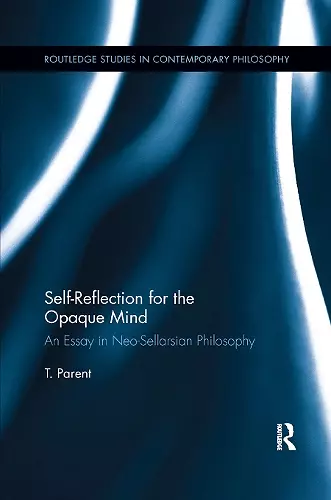Self-Reflection for the Opaque Mind
An Essay in Neo-Sellarsian Philosophy
Format:Paperback
Publisher:Taylor & Francis Ltd
Published:10th Dec '19
Currently unavailable, and unfortunately no date known when it will be back
This paperback is available in another edition too:
- Hardback£155.00(9781138668829)

This volume attempts to solve a grave problem about critical self-reflection. The worry is that we critical thinkers are all in "epistemic bad faith" in light of what psychology tells us. After all, the research shows not merely that we are bad at detecting "ego-threatening" thoughts à la Freud. It also indicates that we are ignorant of even our ordinary thoughts—e.g., reasons for our moral judgments of others (Haidt 2001), and even mundane reasons for buying one pair of stockings over another! (Nisbett & Wilson 1977) However, reflection on one’s thoughts requires knowing what those thoughts are in the first place. So if ignorance is the norm, why attempt self-reflection? The activity would just display naivety about psychology. Yet while respecting all the data, this book argues that, remarkably, we are sometimes infallible in our self-discerning judgments. Even so, infallibility does not imply indubitability, and there is no Cartesian ambition to provide a "foundation" for empirical knowledge. The point is rather to explain how self-reflection as a rational activity is possible.
"Parent has shown significant ingenuity in addressing the tension between our commitment to the value of critical self-reflection and evidence from empirical psychology, and there is much of interest in this book, in particular, the discussion of the philosophical arguments from content externalism to skepticism about self-knowledge." —Notre Dame Philosophical Reviews
"Philosophical reflection on self-knowledge has recently bifurcated into two tendencies: on the one hand, there is increasingly strenuous effort from the armchair to resolve various a priori puzzles concerning the very possibility of self-knowledge, while on the other hand, there is an increasingly empirically informed effort to debunk our pre-scientific pretensions to self-knowledge. Parent’s manuscript provides a scholarly, detailed, and ultimately successful effort to reconcile these two tendencies, while also showing why the topic of self-knowledge is a topic of urgent practical importance. This is an important book." —Ram Neta, University of North Carolina at Chapel Hill, USA
ISBN: 9780367878184
Dimensions: unknown
Weight: 453g
296 pages